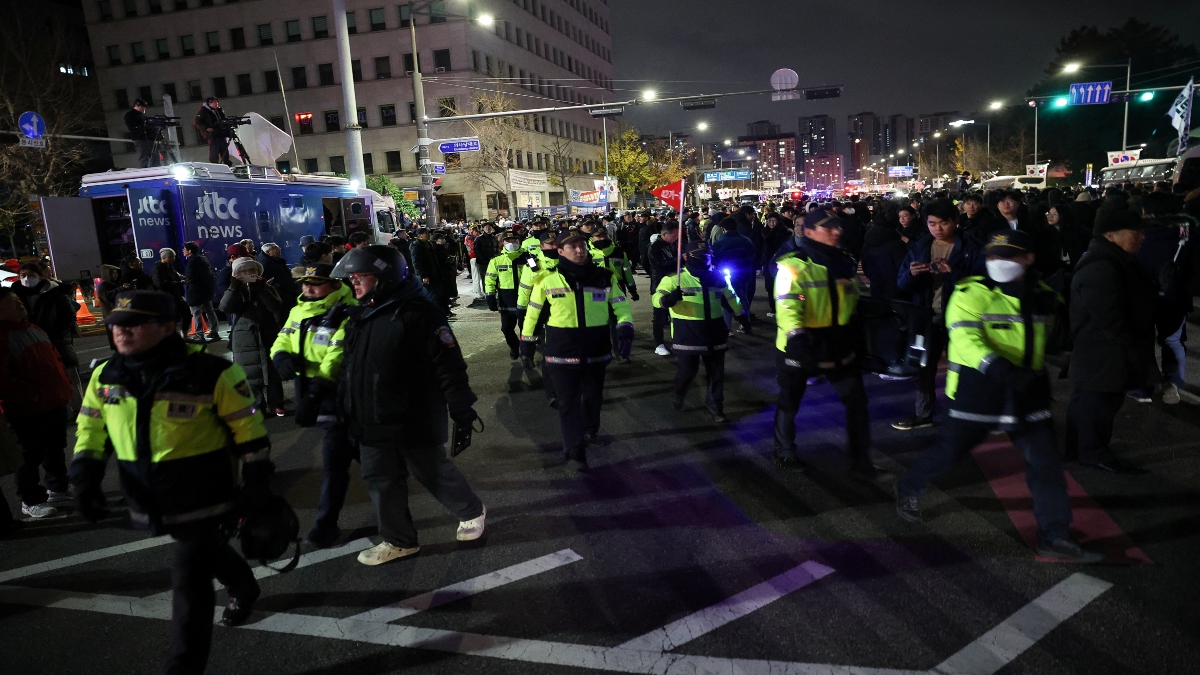The United States, United Nations and Russia on Tuesday raised concerns over the escalating political crisis in South Korea following President Yoon Suk Yeol’s declaration of martial law and the subsequent vote by South Korean lawmakers to block the decree
read more
)
Police officers walk among the crowd, after South Korean President Yoon Suk Yeol declared martial law, in Seoul, South Korea, on Wednesday. Reuters
The United States, United Nations and Russia on Tuesday raised concerns over the escalating political crisis in South Korea following President Yoon Suk Yeol’s declaration of martial law and the subsequent vote by South Korean lawmakers to block the decree.
The US said it was not given any warning by South Korea that President Yoon would declare martial law in a country that is one of Washington’s closest allies.
“The US was not notified in advance of this announcement. We are seriously concerned by the developments we are seeing on the ground,” AFP quoted a White House National Security Council statement as saying.
In a separate statement, the US said that it hoped South Korean authorities would respect a vote by lawmakers to rescind martial law imposed by President Yoon.
“Certainly it is our hope and expectation that the laws and regulations of a particular country are abided by. That does include the National Assembly vote,” AFP quoted State Department spokesman Vedant Patel as telling reporters.
The United Nations said it’s monitoring the political upheaval in South Korea “very closely and with concern”.
“We’re watching the situation very closely and with concern,” AFP quoted Stephane Djuarric, spokesman for Secretary-General Antonio Guterres, as telling reporters.
“The situation is evolving quickly,” he added.
Expressing concern, the Kremlin too said that it’s paying close attention to the development in South Korea.
“The situation is concerning. We are watching closely,” Interfax news agency quoted President Vladimir Putin’s spokesman Dmitry Peskov as saying.
President Yoon declared martial law on Tuesday night, marking the most significant threat to South Korea’s democracy since the 1980s.
Lawmakers swiftly rejected the move in a vote, while protesters gathered outside parliament in opposition.
Yoon framed his declaration as a response to political adversaries, but it was strongly opposed by the parliament speaker and even by Han Dong-hoon, leader of Yoon’s own party, who has previously clashed with the president over his handling of recent scandals.
Under South Korean law, martial law must be lifted immediately if the National Assembly votes against it by a majority.
Live television footage showed helmeted troops attempting to enter the National Assembly, while parliamentary aides used fire extinguishers to push them back.
In a televised address, Yoon accused opposition parties of hijacking the parliamentary process.
He vowed to eliminate what he called “shameless pro-North Korean anti-state forces” and stated that declaring martial law was necessary to protect the country’s constitutional order.
“This declaration is illegal and constitutes a criminal act, directly violating the Constitution and other laws,” Reuters quoted the opposition Democratic Party as saying in response.
“It is essentially a coup d’état,” it added.
Shortly after Yoon made his announcement, people began gathering outside the parliament building, some of them shouting: “Withdraw emergency martial law!”
“Arrest Yoon Suk Yeol” shouted others.
After Yoon’s statement, South Korean military officials said martial law will remain in effect until lifted by the president, according to local broadcaster YTN, other local media reports and AFP, despite the parliament’s vote to lift it.
The military said activities by parliament and political parties would be banned, and that media and publishers would be under the control of the martial law command.
Yoon did not cite any specific threat from the nuclear-armed North, instead focusing on his domestic political opponents. It is the first time since 1980 that martial law has been declared in South Korea.
With inputs from agencies
End of Article


